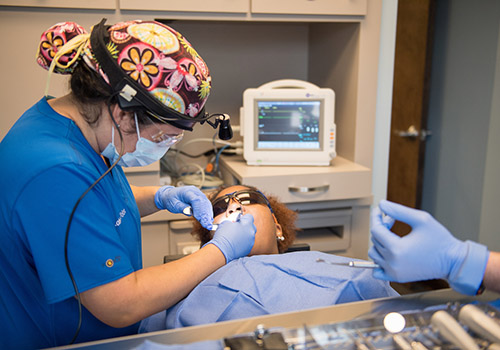 You want to keep your teeth for a lifetime, but circumstances can arise that prompt your dentist to recommend removing a tooth for the good of your dental health. And although many of your teeth are easily removable, it’s occasionally more complicated, and requires a more involved procedure. Here’s why the surgical extraction of teeth may become necessary, and how your dentist differentiates these procedures from others.
You want to keep your teeth for a lifetime, but circumstances can arise that prompt your dentist to recommend removing a tooth for the good of your dental health. And although many of your teeth are easily removable, it’s occasionally more complicated, and requires a more involved procedure. Here’s why the surgical extraction of teeth may become necessary, and how your dentist differentiates these procedures from others.
Why Can’t a Tooth be Saved?
The American Dental Association (ADA) Mouth Healthy site suggests teeth are usually removed due to trauma, disease or crowding. When a tooth cannot be repaired with a filling or a crown because of an accident or extensive decay, an extraction may be your best recourse. Teeth that aren’t supported by enough bone due to periodontal disease are also candidates for removal necessitating the use of a gum-protecting toothpaste following extraction. Infected (abscessed) teeth that don’t respond to root canal treatment may need to be taken out, as well.
Keep in mind it’s not unusual for an orthodontist to recommend an extraction or two before orthodontic treatment begins because of crowed teeth. Similarly, wisdom teeth are frequently extracted because of the awkward position in which they grow behind your molars.
Simple Extractions vs. Surgical Extractions
The surgical extraction of teeth is actually the most common surgical procedure provided in the United States. When a tooth is visible above the gum line and your dentist can easily remove it with forceps, the procedure is called a simple extraction. If a more volatile tooth has yet to grow in, however, your dentist needs to remove gum tissue or bone in order to extract it. This is called a surgical extraction, and requires stitches to close the site so that it can heal properly. The doctor may also prescribe a more specific pain medication following the procedure.
Reasons for Surgical Extractions
By taking an x-ray and examining your tooth, your dentist can usually determine whether or not your extraction will be simple or surgical. But there are times when a simple extraction turns into a surgical. If a tooth breaks off during the procedure, for instance, it may need to be taken out in pieces.
Wisdom teeth often face surgical extraction because they’re usually impacted, meaning they are not completely erupted into the mouth. This condition requires cutting through bone and tissue. Removing severely broken down teeth, root tips or teeth with long-curved roots are other examples of surgical extractions. Then there are times when the bone around a tooth has become dense, resulting in the need for surgical treatment.
Post-Extraction Instructions
With surgical extractions, you’ll most likely have one or more stitches at the extraction site. Regardless of whether your extraction is simple or surgical, it’s always important to closely follow your dentist’s after-care instructions to speed recovery and avoid any complications.
You can view our after care instructions here.
The surgical extraction of teeth may sound a bit daunting, but with today’s modern procedures and anesthesia, you have nothing to worry about. Afterwards, you and your dentist can discuss tooth replacement options to restore the function and beauty to your smile.
Contact us with any questions you may have about your dental health or treatment plan.
Our team is happy to help! CONTACT HERE
